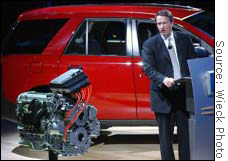DETROIT (CNN/Money) - The auto industry is bracing for a possible oil shock this summer, but industry officials and experts say they don't expect even a sharp rise in gas prices to significantly shake up consumer buying patterns.
The oil shock of the 1970s helped put Japanese automakers on the map in the U.S. market. But today the difference between the fuel efficiency of comparable U.S. and Japanese models is far more limited. And much of the shift in consumer vehicle patterns came in response to gas lines and rationing rather then simple price increases.
 |
|
| GM CEO Rick Wagoner unveils a hybrid gas-electric engine desinged to improve fuel efficiency in the Saturn SUV by 50 percent by late 2005. |
Consumers have become more accustomed to price hikes, and many believe they will weather any increase in prices without changing buying habits away from the less fuel efficient light trucks, such as sport/utility vehicles, pickups and minivans, that now make up a majority of the U.S. auto market.
"When I pay $20,000 or $30,000 or $40,000 for a vehicle, I'm not that worried about 50 cents or a dollar more for a gallon of gas," said Chris Struve, auto analyst for credit rating agency Fitch.
Even if a vehicle gets only 15 miles per gallons and is driven 15,000 miles a year, each 50-cent rise in the price of gas costs a little less than $10 a week more to the car owner.
Automakers say they have contingency plans for responding to an oil shock, but they can't say what they will be until they are able to judge the longevity and consumer reaction to a price rise. It could mean more incentives or production cuts for any models that take sales hits, although inventories are leanest on some of the pickup and SUV models. It's far too soon to judge what the impact of a gas price rise would be, according to executives.
"Certainly none of us did a good job forecasting what the impact of 9/11 would be on the industry," Ford President of North American Operations Jim Padilla said, referring the record pace of vehicle sales in the quarter after the attack.
The Japanese automakers who made their first major inroads in the U.S. during the 1970s fuel crisis say they don't expect to see a huge change in U.S. car buyers' attitude even with a spike in fuel prices.
"If you look at surveys about buying priorities right now, fuel economy ranks sixteenth," Honda spokesman Andy Boyd said. "For Honda buyers, its fourteenth. Only 2 percent of Honda buyers even think of fuel economy at all. It's not even on the radar. A fuel hike might get it on radar, but it probably won't make it item one, two, three of four. They see the larger vehicles meeting other needs and even with $2.50 a gallon gas, they're not going to necessarily give it up."
New fuel technology on horizon
But the low importance of fuel economy to the average U.S. buyer isn't stopping automakers from working on new technologies to improve fuel efficiency, not only so they're not caught behind if someone else has a breakthrough, but also to meet governments' increasingly tough regulations on emissions and fuel economy.
One immediate solution is a hybrid engine that uses both gas and an electric motor, improving fuel efficiency anywhere from 12 to 50 percent, depending on the design.
Honda introduced the first hybrid to the U.S. market in December 1999, and now has two models. Toyota has a hybrid on the market and hopes to sell 300,000 a year, equal to about 17 percent of its 2002 sales volume, by 2005. It also unveiled a new hybrid V6 engine Tuesday, due in two years, that it says will give an SUV the power of a V8 and the fuel economy of a gas-powered compact sedan.
The U.S. manufacturers used the North American International Auto Show in Detroit this week to disclose their own hybrid plans.
General Motors Corp. unveiled three different hybrid engines Monday, and said they would be in some of its most popular pickup, SUV and midsize sedan models later this year. It said it could be making 1 million of the engines a year by the end of the decade.
Ford will offer a hybrid in its compact Escape SUV by the end of the year.
But demand for the engines still is tempered by higher prices. GM CEO Rick Wagoner says if the government wants to encourage the fuel savings of the hybrid, it must help out through fleet purchases for government agencies and tax credits for consumers or both.
"We have to offer products people want to buy, not have to buy," Wagoner said.

|

